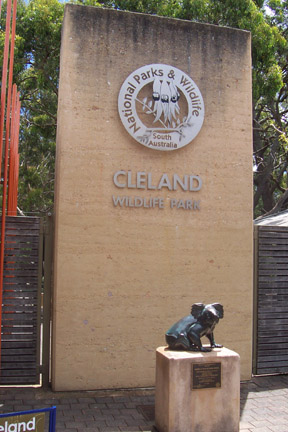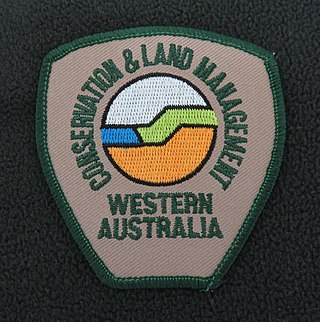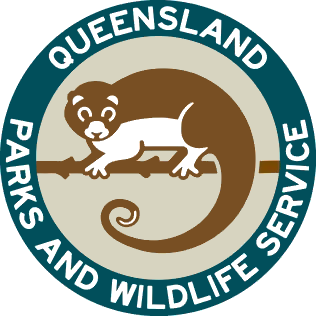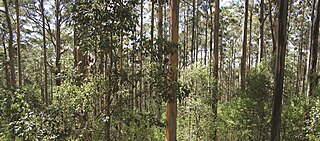
The Department of Environment and Conservation (DEC) was a department of the Government of Western Australia that was responsible for implementing the state's conservation and environment legislation and regulations. It was formed on 1 July 2006 by the amalgamation of the Department of Environment and the Department of Conservation and Land Management.

The Department of Conservation is the public service department of New Zealand charged with the conservation of New Zealand's natural and historical heritage.

The Tasmanian Wilderness World Heritage Area, abbreviated to TWWHA, is a World Heritage Site in Tasmania, Australia. It is one of the largest conservation areas in Australia, covering 15,800 km2 (6,100 sq mi), or almost 25 per cent of Tasmania. It is also one of the last expanses of temperate wilderness in the world, and includes the South West Wilderness.

Conservation Volunteers Australia is an Australian not-for-profit conservation organisation that attracts and co-ordinates volunteers for environmental restoration projects.

Cleland National Park, formerly Cleland Conservation Park, is a protected area located in the Adelaide Hills, South Australia about 22 kilometres (14 mi) south-east of the Adelaide city centre. It conserves a significant area of natural bushland on the Adelaide Hills face, including Mount Lofty Summit and Waterfall Gully.

The Ningaloo Coast is a World Heritage Site located in the north west coastal region of Western Australia. The 705,015-hectare (1,742,130-acre) heritage-listed area is located approximately 1,200 kilometres (750 mi) north of Perth, along the East Indian Ocean. The distinctive Ningaloo Reef that fringes the Ningaloo Coast is 260 kilometres (160 mi) long and is Australia's largest fringing coral reef and the only large reef positioned very close to a landmass. The Muiron Islands and Cape Farquhar are within this coastal zone.

The Department of Conservation and Land Management (CALM) was a department of the Government of Western Australia that was responsible for implementing the state's conservation and environment legislation and regulations. It was created by the Conservation and Land Management Act 1984, also known as the CALM Act, which is still in force as of 2020.

The Queensland Parks and Wildlife Service (QPWS) is a business division of the Department of Environment and Science within the Government of Queensland. The division’s primary concern is with the management and maintenance of protected areas within Queensland, to protect and manage Queensland’s parks, forests and the Great Barrier Reef for current and future generations.

Tasmania Parks and Wildlife Service is the government body responsible for managing protected areas of Tasmania on public land, such as national parks, historic sites and regional reserves. Historically it has also had responsibility for managing wildlife, including game.
FloraBase is a public access web-based database of the flora of Western Australia. It provides authoritative scientific information on 12,978 taxa, including descriptions, maps, images, conservation status and nomenclatural details. 1,272 alien taxa are also recorded.

Warren, also known as Karri Forest Region and the Jarrah-Karri forest and shrublands ecoregion, is a biogeographic region in southern Western Australia. Located in the southwest corner of Western Australia between Cape Naturaliste and Albany, it is bordered to the north and east by the Jarrah Forest region. Its defining characteristic is an extensive tall forest of Eucalyptus diversicolor (karri). This occurs on dissected, hilly ground, with a moderately wet climate. Karri is a valuable timber and much of the karri forest has been logged over, but less than a third has been cleared for agriculture. Recognised as a region under the Interim Biogeographic Regionalisation for Australia (IBRA), and as a terrestrial ecoregion by the World Wide Fund for Nature, it was first defined by Ludwig Diels in 1906.

The Forest Products Commission (FPC) is a Western Australian Government trading enterprise established under an Act of Parliament, responsible for the development and marketing of the state's renewable timber resources. The agency was established as part of the then-Court Government's response to the debate regarding logging in old-growth forests. The minister responsible for the agency is the Minister for Forestry, currently Jackie Jarvis of the Labor Party.

Hobbs State Park – Conservation Area is a 12,056-acre (4,879 ha) Arkansas state park in Benton, Carroll, and Madison Counties, Arkansas in the United States. The park was bought in 1979 through a huge financial effort from Northwest Arkansas banks. Hobbs State Park – Conservation Area is located almost entirely in the Springfield Plateau subdivision of the Ozark Plateau. The park, located just south of Beaver Lake, is open for year-round recreation, including 32.9 miles (52.9 km) of hiking, mountain bike and equestrian trails. Hobbs State Park – Conservation Area also has several picnic areas, a shooting range, and primitive camping sites.
The Department of Parks and Wildlife (DPaW) was the department of the Government of Western Australia responsible for managing lands described in the Conservation and Land Management Act 1984 and implementing the state's conservation and environment legislation and regulations. The minister responsible for the department was the Minister for the Environment.

Turquoise Coast is a name attributed to a section of the coastline of Western Australia in the vicinity of Jurien Bay.

The Great Western Woodlands is located in the southwest of Australia. The woodlands cover almost 16,000,000 hectares, a region larger in size than England and Wales. The boundary of the Great Western Woodlands runs from the Nullarbor Plain in the east to the Western Australian Wheatbelt in the west; from north of Esperance through to the inland mulga country and deserts that are found north of Kalgoorlie.
Penelope Figgis is an Australian environmentalist, activist, and political scientist. Since 2005 she has been the Vice Chair for Oceania of the IUCN World Commission on Protected Areas.
Parks and Wildlife Commission of the Northern Territory is the Northern Territory Government agency responsible for tasks including the establishment of "parks, reserves, sanctuaries and other land", the management of these and the "protection, conservation and sustainable use of wildlife."

The Department of Biodiversity, Conservation and Attractions (DBCA) is the Western Australian government department responsible for managing lands and waters described in the Conservation and Land Management Act 1984, the Rottnest Island Authority Act 1987, the Swan and Canning Rivers Management Act 2006, the Botanic Gardens and Parks Authority Act 1998, and the Zoological Parks Authority Act 2001, and implementing the state's conservation and environment legislation and regulations. The Department reports to the Minister for Environment and the Minister for Tourism.















